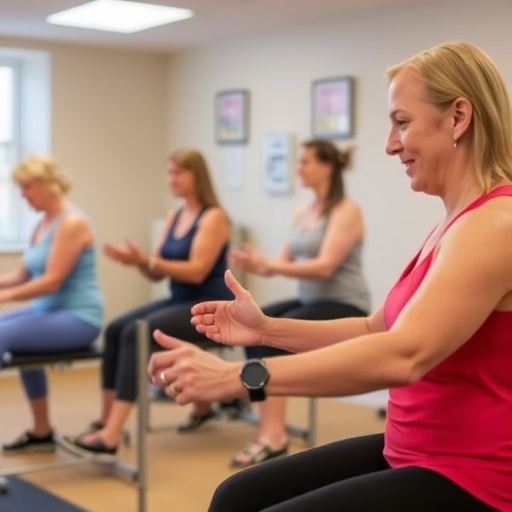A groundbreaking study conducted by Bournemouth University (BU) in collaboration with University Hospitals Dorset (UHD) has brought to light the remarkable benefits of a novel cycling and education intervention for individuals suffering from hip osteoarthritis (OA). Funded by the National Institute for Health Research (NIHR), the research challenges the current standard of care by demonstrating that group-based static cycling combined with educational sessions can lead to superior clinical outcomes compared to conventional physiotherapy. The comprehensive findings of this study are set to be published in The Lancet Rheumatology on July 31, 2025.
Hip osteoarthritis is a degenerative joint disease causing chronic pain and disability, particularly in the elderly population. In the UK alone, over 3.2 million individuals grapple with hip OA out of approximately 10 million osteoarthritis sufferers overall. The traditional therapeutic approach primarily involves one-to-one physiotherapy, which, despite its effectiveness, requires considerable clinical resources and can contribute to extended waiting times. This study, therefore, explores a more scalable and cost-effective alternative — the CHAIN (Cycling against Hip Pain) intervention.
The CHAIN programme, first introduced in 2013, consists of an eight-week regimen combining weekly static cycling exercise classes with targeted education. Unlike passive treatment modalities, this intervention encourages active engagement in muscle strengthening and joint mobilization, aiming to restore hip function and reduce pain symptoms. Participants in the randomized controlled trial who underwent the CHAIN intervention consistently reported greater improvements in hip function and quality of life measures compared to those receiving standard physiotherapy.
.adsslot_MUfPAbJkXt{ width:728px !important; height:90px !important; }
@media (max-width:1199px) { .adsslot_MUfPAbJkXt{ width:468px !important; height:60px !important; } }
@media (max-width:767px) { .adsslot_MUfPAbJkXt{ width:320px !important; height:50px !important; } }
ADVERTISEMENT
The trial, known as CLEAT (Clinical and cost-effectiveness of a cycling and education intervention versus usual physiotherapy care for the treatment of hip osteoarthritis in the UK), employed rigorous randomized controlled methodologies to assess both functional outcomes and economic implications. The results indicated that CHAIN significantly outperformed usual care in terms of clinical recovery metrics, patient satisfaction, and self-reported pain relief, all achieved with a lower overall expenditure of healthcare resources.
Longitudinal follow-ups conducted over five years post-intervention further reinforce the durability of CHAIN’s benefits. Most notably, a significant proportion of participants reported sustained improvements in hip mobility and pain management. Intriguingly, more than half of the subjects had successfully avoided more invasive treatments such as hip replacement surgery, which is known for its high costs and potential complications. This evidence positions static cycling as a transformative first-line therapy within osteoarthritis management paradigms.
Economic analysis presented by Professor Rob Middleton, orthopaedic surgeon at UHD, highlights the profound cost-saving potential embedded in widespread adoption of the CHAIN programme. Given that hip replacement surgeries cost the NHS upwards of £6,000 per patient, initiatives that reduce the need for surgical intervention represent substantial fiscal relief. Furthermore, the capacity to shrink physiotherapy wait times through group interventions advances equitable access to care across diverse patient populations.
From a pathophysiological standpoint, static cycling constitutes a low-impact aerobic exercise that targets muscular stabilization surrounding the hip joint, thereby mitigating joint load and promoting cartilage health. Inflammatory processes central to osteoarthritis progression are modulated through increased joint mobility and improved muscle conditioning fostered by this regimen. Additionally, the educational components equip patients with self-management strategies critical for long-term symptom control.
Patient testimonials vividly illustrate the intervention’s impact. Sue, a participant who was previously incapacitated by debilitating hip pain, experienced a remarkable turnaround. Initially unable to perform basic activities like walking or dancing, she reported noticeable improvements by the third week and regained her ability to engage in her favorite pastimes post-programme. Stories like hers emphasize the profound quality-of-life enhancements achievable through innovative rehabilitation strategies.
Looking ahead, the researchers envision scaling CHAIN nationally and potentially internationally by offering resources and toolkits to clinical teams aiming to replicate the model. Professor Wainwright envisions a future where virtual support combined with localized group sessions ushers in a new standard of care, thereby revolutionizing the management of hip osteoarthritis. Their holistic framework may well set a precedent for managing other degenerative musculoskeletal disorders.
As osteoarthritis incidence escalates alongside population aging, innovations like CHAIN address both clinical and systemic challenges inherent in care delivery. By integrating evidence-based exercise science, patient education, and community resources, this intervention exemplifies a sustainable, cost-effective, and efficacious solution. The healthcare community and policymakers alike will be closely monitoring the impact of this study’s publication and its potential to reshape physiotherapy paradigms.
For those seeking further details, information about the CHAIN programme is accessible on Bournemouth University’s dedicated microsite. The dissemination of knowledge and facilitation of clinician training will be pivotal in unlocking the full potential of this promising intervention, ultimately offering renewed hope and improved functioning to the millions affected by hip osteoarthritis worldwide.
Subject of Research: People
Article Title: Clinical and cost-effectiveness of a cycling and education intervention versus usual physiotherapy care for the treatment of hip osteoarthritis in the UK (CLEAT): a pragmatic, randomised, controlled trial
News Publication Date: 31-Jul-2025
Web References:
CHAIN Programme – Bournemouth University
DOI: 10.1016/S2665-9913(25)00102-X
Image Credits: BH Live
Keywords: Health and medicine; Movement disorders; Rheumatoid arthritis; Osteoarthritis; Arthritis
Tags: Bournemouth University research studychronic pain management strategiescost-effective health interventionscycling intervention for osteoarthritiseducation and exercise for hip paingroup-based physiotherapy alternativeship osteoarthritis treatmentNational Institute for Health Research fundingNHS physiotherapy waiting listsscalable physiotherapy solutionsstatic cycling benefitsThe Lancet Rheumatology publication





